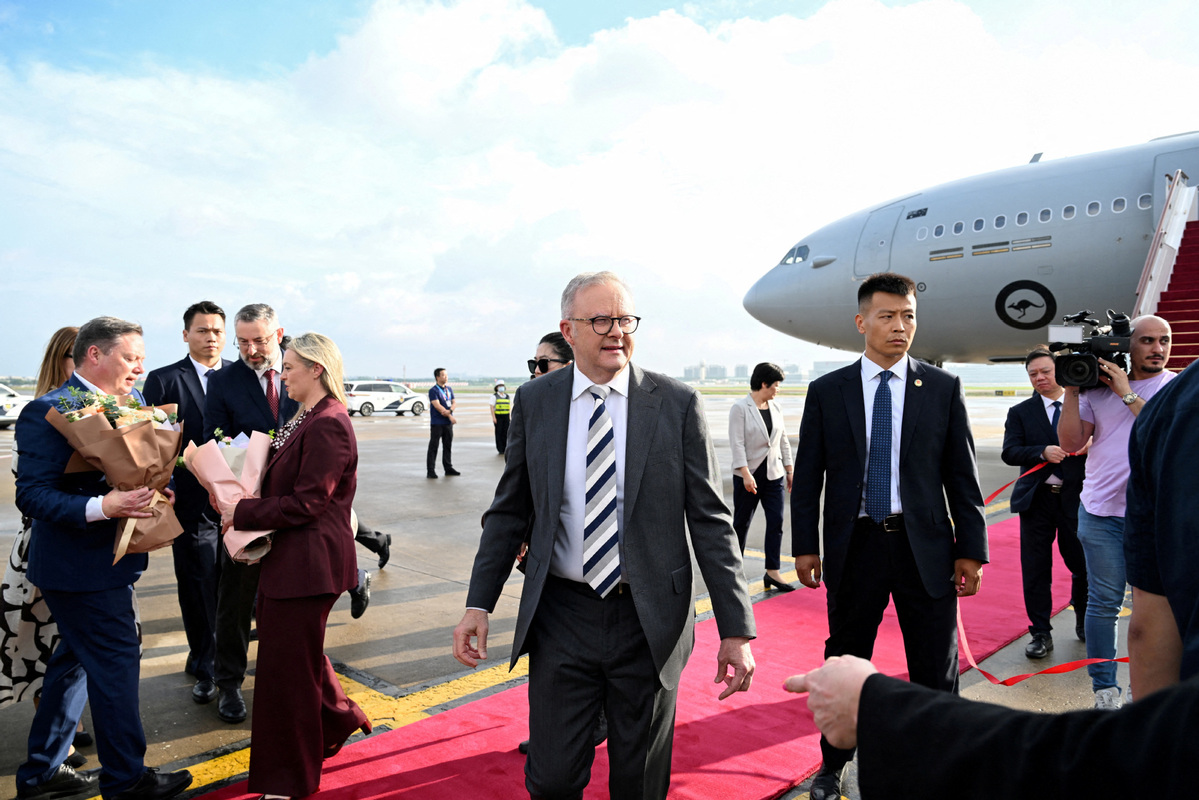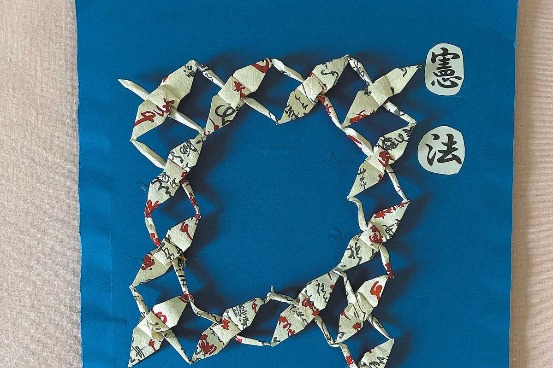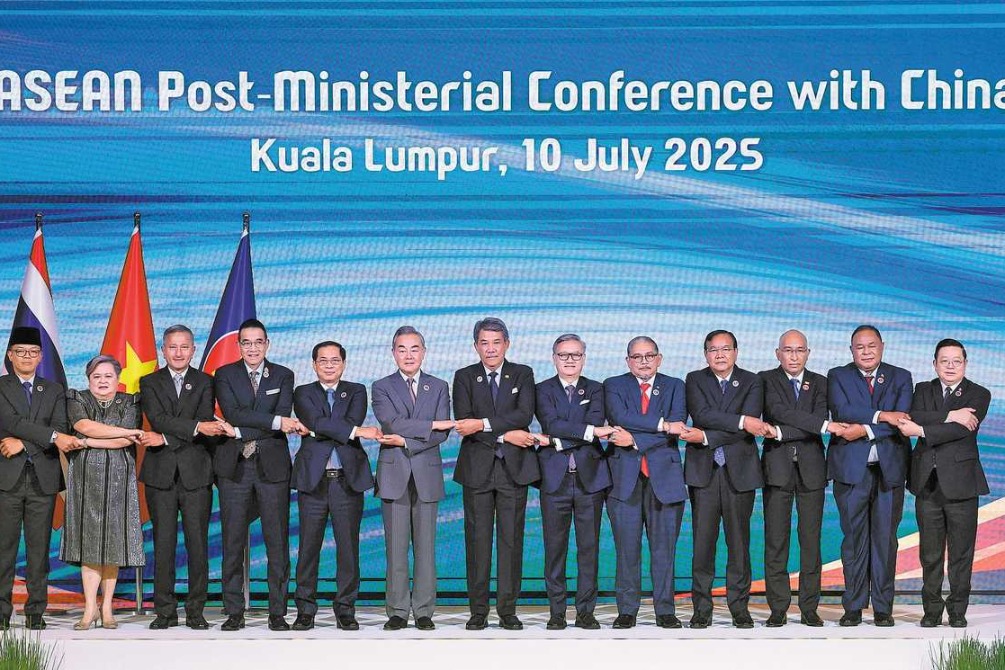Australian PM's visit aims to boost cooperation amid global challenges


Australian Prime Minister Anthony Albanese's weeklong official visit to China reflects the close economic ties between the two countries and offers opportunities for greater cooperation in emerging sectors amid global challenges, according to Australian academic and business analysis.
In addition to high-level meetings in Beijing, Albanese's visit includes stops in Shanghai, where he arrived on Saturday, and Chengdu, the capital of Southwest China's Sichuan province. His trip covers key sectors such as business, investment, tourism and other major sectors to build on Australia's strong economic and trade links with China, according to a statement from his office.
Professor James Laurenceson, director of the Australia-China Relations Institute at the University of Technology Sydney, told China Daily that any leader's visit "positively impacts the bilateral relationship because it shows confidence and commitment at the highest political levels".
"Businesses engaged in the Australia-China economic corridor report that they have benefited from the stabilization in Australia-China relations since 2022," he said.
"At a time of rising geopolitical tensions globally, Australia-China relations take on greater significance. It shows that despite not always being geopolitically aligned, differences can be calmly and professionally managed, and shared interests and mutual benefits can remain the focus," Laurenceson said.
He added that shared interests between the two countries will help fuel exchanges in major fields during the visit, amid current global challenges such as trade tensions from other parts of the world.
"Both Australia and China have enormous, shared interests around trade, and specially, the rules-based trading system that is now coming under pressure," Laurenceson added.
"Climate change and the clean energy transition is another area that will expectedly get a lot of coverage given the two countries' shared interests in that space. Both Australia and China will also raise their differences, but I do not expect these will overshadow an overall positive tone and the fact that these differences are best managed through frank and respectful dialogue," he said.
David Olsson, president and chairman of the Australia China Business Council, told China Daily that Albanese's visit "matters because it signals intent".
"When political leaders are prepared to meet and listen, it creates space for business to step forward. This is especially important in a climate where geopolitical risk and economic uncertainty weigh on investment decisions. Rebuilding trust doesn't happen overnight, but high-level visits show that both sides are serious about stability and cooperation," he said.
Olsson said that trade "has always been a foundation of the Australia–China relationship, and both sides understand its strategic importance".
"We've had a period of disruption, but there's now a shared interest in building confidence and setting a more stable footing for economic engagement. The global economic environment is shifting towards decarbonization, digitalization and regional integration, and these trends are reshaping trade patterns. Australia and China each have strengths to contribute in this transition," he said.
"But it's not just about goods and services. Sustained trade relationships are underpinned by people. We're seeing renewed energy in areas like education, tourism, sports and the arts, all of which help rebuild trust and understanding. That broader engagement adds depth to the economic relationship and supports a more resilient partnership," Olsson said.
"We'll be paying close attention to areas that signal long-term cooperation, particularly in green energy, food and agribusiness, education and professional services, and sustainable infrastructure. These align with where our members see opportunity, and where Australian expertise matches China's evolving needs," he said.
"What's important is continuity. We expect that the visit will unlock momentum, but it's what follows that delivers value. ACBC will build on outcomes by facilitating practical follow-up such as sector-specific working groups and member engagement programs in both countries."
Professor Hans Hendrischke from the University of Sydney Business School told China Daily that Albanese's six-day agenda is "twice as long as a regular state visit for good reasons".
"For both sides, direct personal contact between their political and business leaders is essential to maintain stable economic relations," said Hendrischke, who is professor of Chinese business and management. He also chairs the business and economics cluster of the university's China Studies Centre.
Hendrischke said the cities of Shanghai, Beijing and Chengdu which Albanese is visiting represent his trade, government and investment agenda.
"In trade, Australian iron ore and resources exports to China provide the ballast to the bilateral economic relationship but potentially face the risk of becoming bargaining chips in international geostrategic competition. In this situation, both sides need to reassure each other at the highest level of their commitment to unimpeded trade and investment," the professor said.
"The same applies to trade relations in higher education, high-tech and services which require long-term stability but are open to political interference," he said.
Hendrischke said that in Chengdu, easing restrictions on Chinese investment in Australia through pro-active industrial policy will be one of the topics of discussion, with Australian firms having successfully invested in high-tech industries in Southeast Asian and South Asian markets.
"Investment cooperation between Australia and China has declined to a concerning level with Chinese investment now at the lowest level since the early 2000s and confined to smaller projects mainly in the resources sector with little impact on the trade relationship," he said.
"In comparison, Chinese companies are investing far larger volumes in manufacturing and high-tech investing into regional economies from Thailand to Indonesia. New high-tech industrial clusters emerging with Chinese help in these countries will be future competitors of industries springing up under the Future Made in Australia policies," Hendrischke said, referring to the initiative for the green transition of the economy.
Chengdu is the likely place where Albanese will be shown "the latest results of state-planned industrial policy that could be pro-actively applied to support cooperation between Australian and Chinese companies similar to the way international investment has contributed to the growth of new greenfield industries" around the provincial capital, he said.
Referring to the China-Australia Free Trade Agreement, which marks its 10th anniversary this year, Hendrischke noted that China's proposal to integrate artificial intelligence and foreign direct investment into a revised ChAFTA would also "open the way for Australia to direct Chinese investment into areas of national benefit, such as renewable energy, agribusiness and high-tech services".
Laurenceson from the Australia-China Relations Institute said "there will be plenty of areas where both sides can explore greater cooperation under the framework of ChAFTA", such as the mutual recognition of skills qualifications and product and service standards.
"The benefits from ChAFTA are plain from the data. Other major countries like the US are walking back on their previous trade agreements," he said.
Olsson from the Australia China Business Council said "business in both countries has a constructive role to play in the relationship, not just as a beneficiary of improved ties, but as an active contributor to shaping a future-oriented agenda".
The Albanese visit, which includes a CEO roundtable for Australian and Chinese business leaders to strengthen trade and investment, is "another opportunity to demonstrate that commitment and reinforce the value of practical, respectful engagement between our two countries," he said.
































